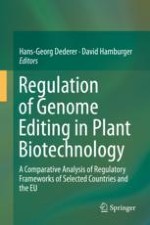2019 | OriginalPaper | Buchkapitel
2. Regulation of Genome Editing in Plant Biotechnology: Argentina
verfasst von : Agustina I. Whelan, Martin A. Lema
Erschienen in: Regulation of Genome Editing in Plant Biotechnology
Aktivieren Sie unsere intelligente Suche, um passende Fachinhalte oder Patente zu finden.
Wählen Sie Textabschnitte aus um mit Künstlicher Intelligenz passenden Patente zu finden. powered by
Markieren Sie Textabschnitte, um KI-gestützt weitere passende Inhalte zu finden. powered by
